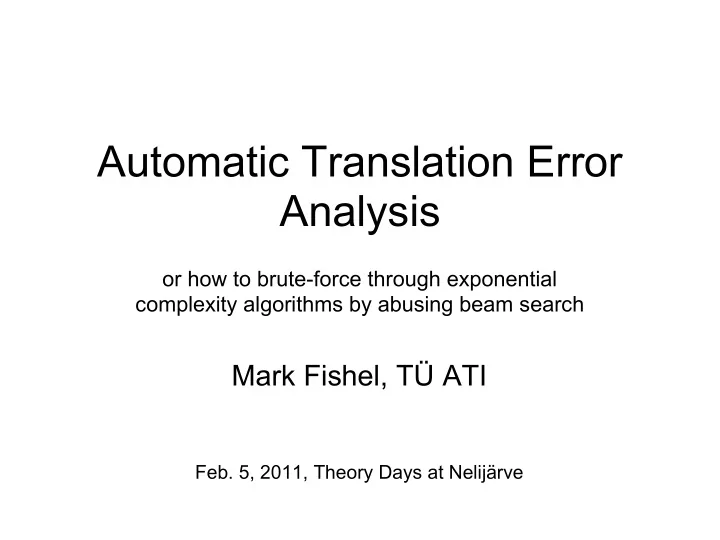

Automatic Translation Error Analysis or how to brute-force through exponential complexity algorithms by abusing beam search Mark Fishel, TÜ ATI Feb. 5, 2011, Theory Days at Nelijärve
Outline Approaches to MT evaluation Automatic analysis of translation errors alignment error detection error summarization Meta-evaluation First results Future work
Translation "Была у Мэри маленькая овечка и большая собака." "Mary had a little lamb and a big dog." "Mary was a little lamb and a large dog." "Maryl was small ovine species and a dog."
Evaluation Mostly done by comparison between the produced translation (hypothesis) and a correct one (reference) Manual Automatic WER, BLEU, NIST, Adequacy/fluency, METEOR, TER, Score rank, HTER SemPOS, LRscore, ... ad ∞ Analysis (Vilar et al. 2006) Our work Score -- good for comparison, but not informative Manual -- expensive
Translation errors by Vilar et al. (2006): Punctuation Missing words (in the reference) Content word Functional word Incorrect words (in the hypothesis) Incorrect sense/form Extra word Style, idioms Unknown words (in the hypothesis) Unknown stem/form Word order (in the hypothesis) Short/long range Word/phrase
Automatic error analysis Alignment between the hypothesis and the reference Error detection and classification Error summarization Result -- ~equivalent to Vilar et al.'s error classification
Alignment Almost trivial, except for ambiguous alignment pairs repeating words (esp. punctuation, articles, etc.) surface forms of one lemma synonyms
Alignment solution Align using lemmas/synonym sets Alignment modelled as a HMM observed variables -- hypothesis words hidden variables -- reference words emission probabilities allow matching words to align: transmission probabilities penalize long-distance reordering: We want only 1-to-1 alignments makes search cost exponential do a beam search
Lexical error detection unaligned ref words -- missing unaligned hyp words present in src? untranslated else, extra word aligned, different surface form synonyms or wrong surface form
Order error detection
Order error detection Can be used to calculate permutation distance Hamming distance Kendall's τ distance Ulam's distance Spearman's rank correlation coefficient Find misplaced words and phrases
Misplaced units Breadth-first search for a minimum number of unit shifts vertices: permutations of the hypothesis ranks edge present if the two permutations differ by two adjacent symbols in the wrong order edge weight is 0 for block shift continuation, or 1 otherwise avoid exponential cost with beam search Here: 1 word shift and 1 phrase shift
Error summarization Can be performed on different levels keep list of errors for every translated sentence usable for examining errors sentence-by-sentence summarize total number of errors, per category apply part-of-speech tagging to classify content/functional words present error numbers in percentage of total words in ref/hyp usable for overall system weakness comparison linear combination of the ratio of different error types -- score!
Summary Fast Inexpensive Language-independent, but can benefit from linguistic analysis
Meta-evaluation For scores -- correlation with human judgements For analysis -- precision/recall of error detection Both require manual labor Manual analysis requires a lot of labor
First results 2656 sentences, from http://masintolge.ut.ee/ input, manually translated into English translated automatically with Google and 2 UT systems UT-Base UT-Newer Google 54.29% 41.52% Missing 51.79% 10.08% 8.77% 2.40% Untranslated 33.96% 38.77% 30.23% Extra Wrong form 2.40% 2.83% 3.05% Misplaced 6.89% 7.09% 7.45% Rho 0.905 0.904 0.921
Future work Improve alignment Structural order error detection, with syntactic analysis Perform meta-evaluation Scoring, tuning weights to fit dev set
Thank you!
Recommend
More recommend